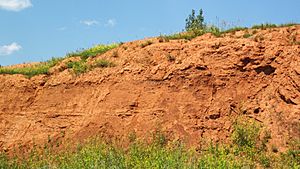Spearfish Formation facts for kids
Quick facts for kids Spearfish FormationStratigraphic range: Permian–Triassic |
|
|---|---|
 |
|
| Type | Geological formation |
| Underlies | Sundance Formation, Gypsum Spring Formation, Piper Formation |
| Overlies | Minnekahta Limestone |
| Thickness | 350–800 feet (110–240 m) |
| Lithology | |
| Primary | Siltstone, sandstone |
| Other | Shale |
| Location | |
| Region | Black Hills and nearby states |
| Country | United States |
| Type section | |
| Named for | Spearfish, South Dakota |
| Named by | Darton, 1899 |
The Spearfish Formation is a special type of rock layer. Scientists call these layers geological formations. This one was first found in the Black Hills area of South Dakota, United States. But you can also find it in other states like North Dakota, Wyoming, Montana, and Nebraska.
This formation is made of many different kinds of rocks. It often looks like a "red bed" because of its color. It formed a very long time ago, during the Permian and Triassic periods.
Contents
What is the Spearfish Formation?
The Spearfish Formation is a mix of different rock types. It's known for its reddish color, which comes from minerals like iron.
What is it Made Of?
The rocks in the Spearfish Formation change from bottom to top.
- Lower down, you often find siltstone and gypsum.
- Higher up, there's more sandstone and shale.
- Other rocks found here include claystone, conglomerate (rocks made of pebbles), dolomite, and even oil shale.
How Did it Form?
Scientists believe the Spearfish Formation formed in a place that was partly shallow ocean and partly land near the coast. Think of a place like the modern Persian Gulf.
Over time, the environment changed:
- Some areas were like salty lakes or small, cut-off parts of the sea. This is where gypsum formed.
- Very salty water created limestone.
- Special mats of tiny living things in salty water formed oil shale.
- Areas called sabkhas (flat, salty coastal areas) formed dolomite.
The sea slowly pulled back during the time these rocks were forming. This means the area changed from being mostly shallow ocean to more of a coastal land environment.
What Fossils Are There?
It's not easy to find many fossils in the Spearfish Formation. So far, scientists have only discovered a few things:
- Stromatolites: These are layered structures made by tiny microbes, like the oldest signs of life on Earth.
- Casts of bivalves: These are like molds left behind by ancient clams or mussels.
- Trace fossils: These aren't parts of animals, but signs they were there, like footprints or burrows.
 | Delilah Pierce |
 | Gordon Parks |
 | Augusta Savage |
 | Charles Ethan Porter |

